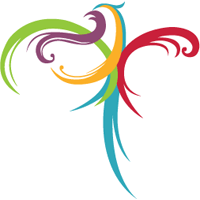YOGYAKARTA
Map
Jogjakarta City (also Jogja, Yogya, Jogjakarta) is a city in the Yogyakarta Special Region, Indonesia. It is renowned as a center of classical Javanese fine art and culture such as batik, ballet, drama, music, poetry, and puppet shows. It is also famous as a center for Indonesian higher education. Yogyakarta was the Indonesian capital during the Indonesian National Revolution from 1945 to 1949.
Orientation
The kraton's main pavilion
Water palace
The area of the city of Yogyakarta is 32.5 km². While the city sprawls in all directions from the kraton, the core of the modern city is to the north, centering around the site of a few buildings with distinctive Dutch colonial-era architecture and the contemporary commercial district. Jalan Malioboro, with rows of sidewalk vendors and nearby market and malls, is the primary shopping street for tourists in the city, while Jalan Solo, further north, is a shopping district more frequented by locals. At the southern end of Malioboro, on the east side is the large local market of Beringharjo, not far from Fort Vredeburg a restored Dutch fort.
At Yogyakarta's center is the kraton, or Sultan's palace. Surrounding the kraton is a densely populated residential neighborhood that occupies land that was formerly the Sultan's sole domain. Evidence of this former use remains in the form of old walls and the ruined Taman Sari, built in 1758 as a pleasure garden. No longer used by the sultan, the garden had been largely abandoned. For a time, it was used for housing by palace employees and descendants. Reconstruction efforts began in 2004, and an effort to renew the neighborhood around the kraton has begun. The site is a developing tourist attraction.
Arts and culture

Yogyakarta is known for its silver work, leather puppets used for shadow plays (wayang kulit), and a unique style of making batik dyed fabric. It is also known for its vivid contemporary art scene. Yogyakarta is also known for its gamelan music, including the unique style Gamelan Yogyakarta, which developed in the courts.
Yogyakarta is also a haven for underground art. It is home to many independent filmmaking communities, independent musicians, performance artists, and visual artists. One underground community that is internationally reputable among art collectors but barely heard of within the country is the Taring Padi community in Bantul, which produces posters using a technique called cukil. daren kidul Dono Kerto Turi
Demography and language
Most population is Javanese, but being a student city, there are also significant population of people from other ethnicities in Indonesia. This status makes Yogyakarta as one of the most heterogeneous city in terms of ethnicity in Indonesia. Indonesian as the official national language, and Javanese are widely used as daily spoken languages, especially by the Javanese.
Transportation
Trans Jogja Bus. A bus rapid transit system in Yogyakarta city
Yogyakarta Hotels
Grand Quality Hotel Yogyakarta
Jl. Adisucipto No. 48, P.O. Box 82, Yogyakarta 55281, Indonesia
Indonesia
Puri Artha Hotel
Jl. Cendrawasih No. 36
Indonesia
INNA GARUDA YOGYAKARTA
Jl. Malioboro 60
Yogyakarta 55213, Indonesia
Hotel telephone: 91 7638011
Reservations telephone: 1-214-357-5522
Grand Mercure Yogyakarta
Jl Jenderal Sudirman 9
Yogyakarta 55233, Indonesia
Reservations telephone: 62/274/566617
Yogyakarta Special Food
Bakpia peck
Bakpia bakpia is based snacks green beans, by-by from Jogja. It is not difficult to find food on this one. Because fame as a typical food of Jogja, almost every shop souvenirs scattered throughout Jogja offers bakpia as souvenirs typical of Jogja. Any famous brand of choice for tourists who do not want to get too dizzy to choose.
Gudeg
Jogja is warm food (vegetables), which is the typical food of Jogja as well. This food is made from young jackfruit basic ingredients and chicken, and certainly with the complete condiments to make this food has a taste very delicious.
Labels: Yogyakarta













0 comments:
Post a Comment